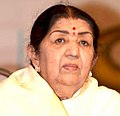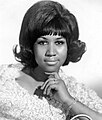The Pop Music Portal
Pop music is a genre of popular music that originated in its modern form during the mid-1950s in the United States and the United Kingdom. During the 1950s and 1960s, pop music encompassed rock and roll and the youth-oriented styles it influenced. Rock and pop music remained roughly synonymous until the late 1960s, after which pop became associated with music that was more commercial, ephemeral, and accessible.
Identifying factors of pop music usually include repeated choruses and hooks, short to medium-length songs written in a basic format (often the verse–chorus structure), and rhythms or tempos that can be easily danced to. Much of pop music also borrows elements from other styles such as rock, urban, dance, Latin, and country. (Full article...)
Leah LaBelle Vladowski (September 8, 1986 – January 31, 2018) was an American singer. She rose to prominence in 2004 as a contestant on the third season of American Idol, placing twelfth in the season finals. In 2007, LaBelle began recording covers of R&B and soul music for her YouTube channel. These videos led to work as a backing vocalist starting in 2008 and a record deal in 2011 with Epic in partnership with I Am Other and So So Def Recordings. LaBelle released a sampler, three singles, and a posthumous extended play (EP).
Born in Toronto, Ontario, and raised in Seattle, Washington, LaBelle began pursuing music ambition as a career in her teens. As a child, she performed in the Total Experience Gospel Choir and the musical Black Nativity. In 2005, LaBelle attended the Berklee College of Music for a year before dropping out and relocating to Los Angeles. While in college, she collaborated with Andreao Heard on a demo. Following the advice of an industry contact, LaBelle released her music through her YouTube channel. Keri Hilson hired LaBelle as a backing vocalist after hearing her rendition of "Energy", which led to her working for other artists on their tours. (Full article...)
808s & Heartbreak is the fourth studio album by the American rapper Kanye West. It was released by Def Jam Recordings and Roc-A-Fella Records on November 24, 2008, having been recorded earlier that year in September and October at Glenwood Studios in Burbank, California and Avex Recording Studio in Honolulu, Hawaii. Dominating its production, West was assisted by fellow producers No I.D., Plain Pat, Jeff Bhasker, and Mr Hudson, while also utilizing guest vocalists for some tracks, including Kid Cudi, Young Jeezy, and Lil Wayne.
Conceived in the wake of West's breakup with his then-fiancée Alexis Phifer and the death of his mother Donda West in 2007, 808s & Heartbreak marked a major artistic departure from his previous rap records. Instead, West performed sung vocals that were processed through an Auto-Tune processor against an electronic production and minimalist sonic palette, including prominent use of minor keys and the Roland TR-808 drum machine. West's lyrics on the album explore themes of loss, alienated fame, and heartache, inspired by the distressing personal events, as well as his struggles with pop stardom. (Full article...)
General images
"We Are the World" is a charity single recorded by the supergroup USA for Africa in 1985. It was written by Michael Jackson and Lionel Richie and produced by Quincy Jones and Michael Omartian for the album We Are the World. With sales in excess of 20 million physical copies, it is the eighth-best-selling single of all time, meant to raise money for the 1983–1985 famine in Ethiopia.
Soon after the British group Band Aid released "Do They Know It's Christmas?" in December 1984, musician and activist Harry Belafonte decided to create an American benefit single for African famine relief. With fundraiser Ken Kragen, he enlisted several musicians. Jackson and Richie completed the writing the night before the first recording session, on January 21, 1985. The event brought together some of the era's best-known musicians. One musician deliberately omitted was John Denver, who had asked to participate but was rejected despite his previous commitment to charity work. Ken Kragen said it was due to some people feeling that Denver's image would affect the credibility of the song as a pop-rock anthem. "I didn't agree with this assessment," Kragen said, but reluctantly turned Denver down. Denver recalled the rejection in his 1994 autobiography "Take Me Home", stating that "It broke my heart not to be included." (Full article...)
Did you know (auto-generated)

- ... that the alt-pop musician Lucy Tun cites death metal and RuPaul's Drag Race as influences?
- ... that Pachelbel's Canon is notorious for being widespread in pop music, but it actually isn't?
- ... that the first episode of the British pop music TV show Top of the Pops was broadcast on 1 January 1964 from Dickenson Road Studios, a converted church in Manchester?
- ... that 22-year-old singer Milena Warthon has created a new genre, pop andino, by fusing pop and Andean music?
- ... that Eternal Blue, a metalcore album, was inspired in part by 1980s pop music?
Selected image -
Related portals
Pop music by decade
WikiProjects
- Wikipedia:WikiProject Pop music was created with the purpose of assembling writers and editors interested in Pop music.
- The aim of this project is to standardize and improve articles related to the various genres of Pop music, as well as to create missing articles.
- To become a member of the WikiProject (anyone may join), simply click here and add your username.
| B | C | Start | Stub | List | Category | Disambig | Draft | File | Portal | Project | Redirect | Template | NA | ??? | ||||
| 127 | 0 | 1,638 | 1,185 | 3,955 | 11,468 | 6,740 | 114 | 472 | 1,779 | 10 | 138 | 273 | 1 | 32 | 1,494 | 1,923 | 15 | 951 |
Associated Wikimedia
The following Wikimedia Foundation sister projects provide more on this subject:
-
Commons
Free media repository -
Wikibooks
Free textbooks and manuals -
Wikidata
Free knowledge base -
Wikinews
Free-content news -
Wikiquote
Collection of quotations -
Wikisource
Free-content library -
Wikiversity
Free learning tools -
Wiktionary
Dictionary and thesaurus


























![Image 26Bing Crosby was one of the first artists to be nicknamed "King of Pop" or "King of Popular Music".[verification needed] (from Pop music)](http://upload.wikimedia.org/wikipedia/commons/thumb/4/4d/Bing_Crosby_1930s.jpg/96px-Bing_Crosby_1930s.jpg)








































